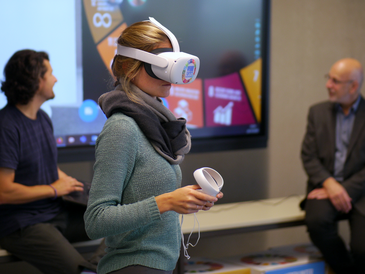Learning sustainability in virtual space
In the Department of Economics at the University of Bremen, the research project SDG-BOT will start in January 2021 with the aim of developing a virtual teaching-learning environment for the implementation of the Sustainable Development Goals (SDG) in Mixed Reality.
The use of Mixed Reality (Augmented and Virtual Reality - AR/VR) in teaching offers added value in two ways: on the one hand, it teaches digital skills that are increasingly needed in students' professional and private lives; on the other hand, Mixed Reality offers the potential to enable innovative learning processes in the field of sustainability and to raise learning to a new level.
One Million Euro Support from Volkswagen AG
The SDG-BOT research project is a project of Prof. Dr. Georg Müller-Christ's Sustainable Management Department in cooperation with Dr. Denis Pijetlo-vic's HumanRoboLab (HRL). Both are researchers in the Department of Economics at the University of Bremen. The research project is financially supported by the EIB Settlement Agreement of Volkswagen AG. In addition to SDG-BOT, the VW programme is funding another university project from the universities of ETH Zurich and the University of Cambridge.
Remote, innovative and co-creative
The research project aims to offer all students at German-speaking universities a digital learning opportunity in Mixed Reality, in which they can learn collaboratively through research in the field of sustainability, especially the Sustainable Development Goals (SDG). In the future, students will be supported in the learning and research process in the mixed reality learning environment by an avatar based on conversational AI.
Creating new virtual learning spaces
"With SDG-BOT, we aim to develop a virtual design space for teaching that is suitable for learning and research on sustainability and in which practicable approaches and new ideas for achieving the 17 United Nations Sustainable Development Goals (SDGs) are developed. We are convinced that exploratory projects like SDG-BOT make sense in order to transform the economic system more strongly in the direction of resource-oriented sustainability," says Prof. Dr. Georg Müller-Christ about the research project.
Corona as a catalyst for digital co-creativity
The relevance of the research project for teaching becomes particularly clear against the backdrop of the current Corona measures: "Due to the Corona crisis, virtual events, video chats and zoom meetings have become the norm for students. With the SDG-BOT, we want to go one step further and offer students an immersive learning experience in which they can remotely and co-creatively engage in research on sustainability," comments Dr Denis Pijetlovic. Accordingly, the research and learning process for both the project's research assistants and students will be based on a co-creative research approach. In several iterative phases of exploration, design and evaluation, prototypes will be developed that will be analysed for their effectiveness through testing and subsequently modified according to the results.
Linking digitalisation and sustainability creates synergies
The implementation of the SDGs is one of the major educational challenges for the higher education system within the framework of the UN Agenda 2030. The SDG-BOT research project thus makes a presentation to the sustainability strategy of the University of Bremen and at the same time is an extension of the digital learning and teaching offer. Valuable synergies are thus created within the framework of the research project in order to advance the two priority topics of sustainability and digitalisation more strongly.
The project is supported by the two research assistants Frederike Bursee and Carry Luise Zimmermann, who are working on their dissertations on AI-based digital assistants and the effect of immersive virtual experiences on learning processes. Their results offer a significant aspect for the design of the virtual teaching-learning environment.
Information on the Human-Robo-Lab can be found here:
https://www.uni-bremen.de/nm/transfer/human-robo-lab
The media information from VW on the Settlement Agreement can be found here:
An overview of all projects can be found here:

